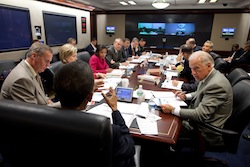What's at Stake with the Nuclear Posture Review
March 1, 2010
Featured Image
We are happy to serve you a daily summary of the day's top nuclear policy stories each morning, with excerpts from the stories in bullet form.
Stories we're following today:
New Think and Old Weapons - The New York Times [link]
- Every four years the White House issues a “nuclear posture review.” The president needs to get this right. It is his chance to finally jettison cold war doctrine and bolster America’s credibility as it presses to rein in Iran, North Korea and other proliferators.
- Mr. Obama’s aides have proposed changing that to say that the “primary” purpose of nuclear weapons is to deter a nuclear attack against the United States or its allies.
- Given America’s vast conventional military superiority, broader uses are neither realistic nor necessary. Any ambiguity undercuts Washington’s credibility when it argues that other countries have no strategic reason to develop their own nuclear arms. The sole purpose of American nuclear forces should be to deter a nuclear attack against this country or its allies.
- Today’s greatest nuclear danger is that terrorists will steal or build a weapon. That is best countered by halting proliferation and securing and reducing stockpiles and other material.
Barack Obama Orders New Nuclear Review Amid Growing Feud - The Observer [link]
- President Barack Obama has ordered the rewriting of the draft new US Nuclear Posture Review (NPR), amid frustration in the White House that the document fails to reflect his aspirations for a nuclear-weapons-free world and an end to "cold war thinking".
- The consequence has been a split in the administration among those involved in writing the review into two fiercely opposed camps – one led by the vice-president, Joe Biden, who is lobbying for Obama's position, and the other clustering around the secretary of defense, Robert Gates.
- At the centre of that will be the NPR. "My understanding," says Joe Cirincione, President of the Ploughshares Fund, "is that the president and vice-president are unhappy with the draft that has been produced. Nothing has been settled on the key issue: what is the use for our nuclear weapons? This is an issue that the president cares deeply about."
Russian START Negotiators Going Home but to Return - Reuters [link]
- Russian arms control officials are leaving Geneva at the weekend for Moscow but negotiations with the United States on a START successor treaty are expected to resume in coming weeks, an official told Reuters on Friday.
- The pause appeared to signal that high-level consultations in the capital are needed on final details of the pact to cut strategic nuclear weapons, analysts said.
- "Our delegation will be leaving this weekend. I don't know the new date of negotiations, maybe on March 8th or 15th," an official at the Russian diplomatic mission told Reuters.
- State Department spokesman P.J. Crowley said on Tuesday the United States believes an agreement is now clearly in sight.
Iran Relations With IAEA Turn Contentious - The Los Angeles Times [link]
- Reporting from Beirut - Iran has dramatically shifted its public tone toward the United Nations' nuclear watchdog, dropping its previous deference while harshly criticizing the agency's latest report and its new director-general as an incompetent and biased lackey of the West.
- Japanese diplomat Yukiya Amano took the reins at the Vienna-based agency in December after the 12-year tenure of Egyptian Mohamed ElBaradei ended. The agency delivered its first report under his leadership on Feb. 18, explicitly suggesting for the first time that Iran was trying to build a nuclear bomb.
- Experts acknowledge that the latest report was more assertive in highlighting the agency's complaints about Iran's nuclear program and less willing to acknowledge instances of its cooperation.
- The attacks against Amano may be aimed at putting pressure on him to soften the tone of future reports.
Winning the Nuclear PR War - The Daily Kos [link]
- Commentary on the NPR has ranged from tersely worded reprimands to constructive attempts to discover reasons for the delay, as well as a number of thoughtful "what next?" pieces.
- Most significant were a couple of pieces on New START, published by Josh Rogin at The Cable (a Foreign Policy blog). The pieces were significant because, despite their questionable sourcing, they were snapped up with very few questions asked. The lack of response by the Obama administration was also significant.
- Rogin's tendency to rely on opposition sources for information, anonymous or otherwise, should be a red flag for the White House.
- Allowing one of the fiercest opponents to nuclear arms control to dominate the debate is dangerous in so many ways.
- The lesson to the Obama administration is this: do not let the opposition get the upper hand here. They know what they're doing, and they will get their way. Come out with a statement before it's too late.



